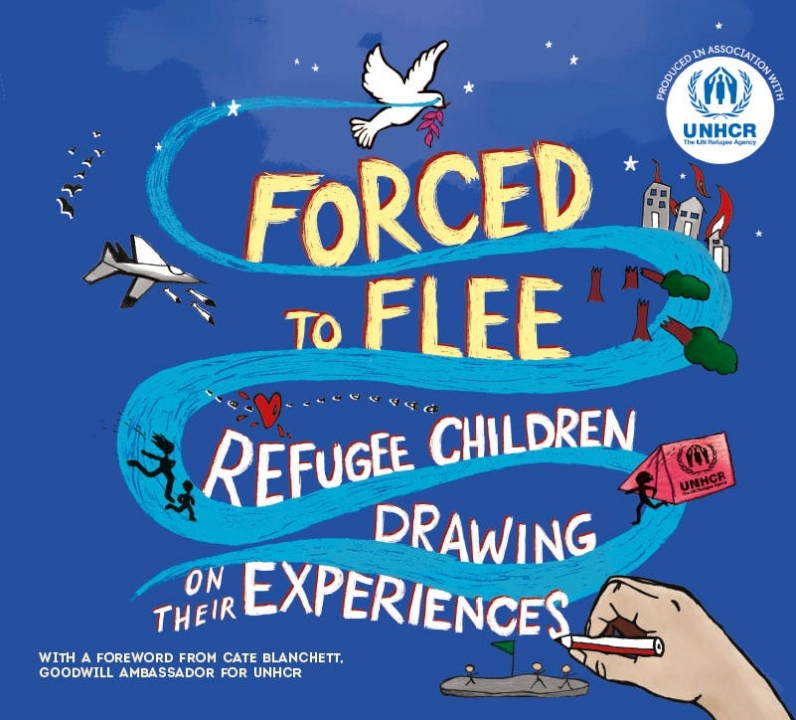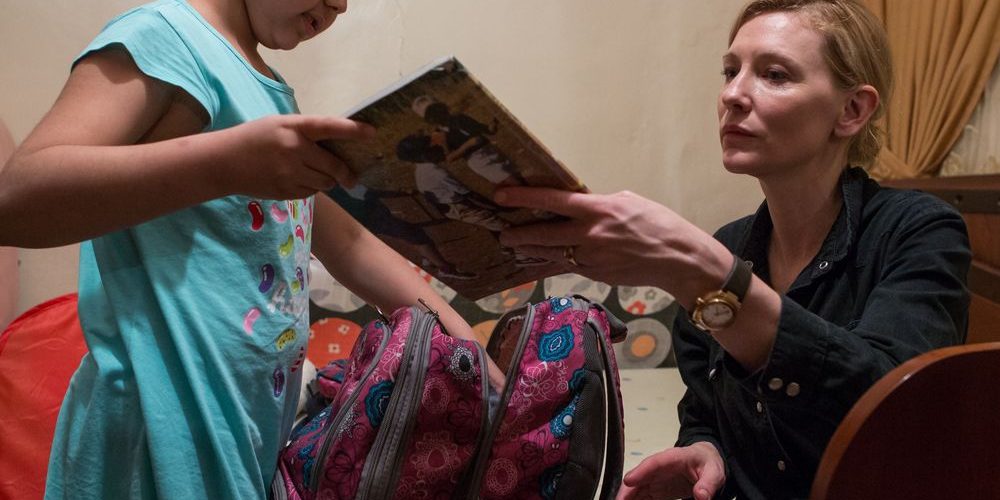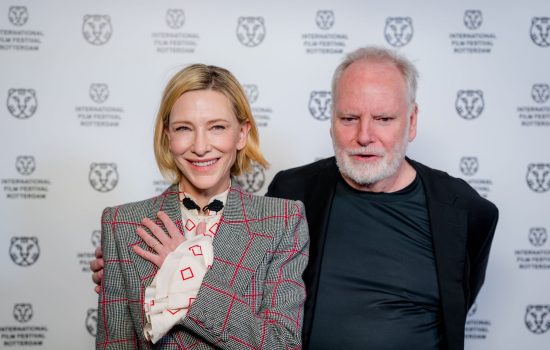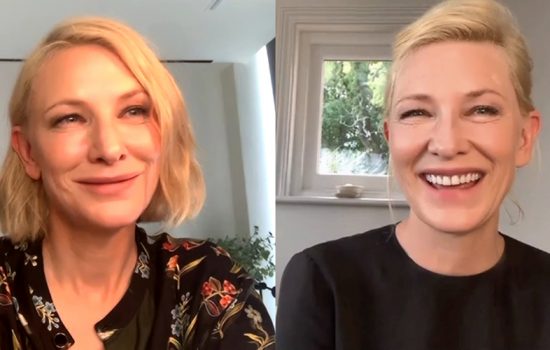Hello Blanchetters!
Back in 2015 Cate was appointed Goodwill Ambassador for the UNHCR, United Nations High Commissioner for Refugees, leading to a fruitful partnership and collaboration.
One week after the annual World Refugee Day, the UNHCR released a new podcast inteview from the series Awake at Night. You can listen it here. Alongside the podcast the UN Refugee Agency relased two new pictures from Cate’s humanitarian missions in Lebanon (2015) and in Bangladesh (2018).
Thanks to Catepedia on the CBFchat, we have news about another project Cate was involved in: she has written the foreword for the new book Forced to Flee, featuring pictures of refugees children:

The book is on sale from June 25. More infos here
We have also added to the gallery a new picture from the Hands Up for Syria fundraising (2016)
and we have replaced the picture below with a larger version (The Ideas Box – Google Zeitgeist). Enjoy!

Article
actor, Oscar-winner and mother of four Cate Blanchett is the final guest of this season’s award-winning podcast series Awake at Night, hosted by the UN Refugee Agency. The podcast centres around remarkable individuals engaged in supporting refugees, and Blanchett, a UNHCR Goodwill Ambassador, has dedicated herself to the cause since 2014.
In a frank and emotional conversation with Melissa Fleming, UNHCR’s Head of Global Communications, Blanchett reflects on her experiences during prior field visits with UNHCR. She recalls her time in Jordan, accompanied by her son Iggy, where she met Syrian refugees: “In Jordan you have two refugee camps [Azraq and Za’atari] and one of them is completely barren, it’s almost like a moonscape. We had this extraordinary lunch with an extended family that had been in the camp for quite some time. One of the boys was going out to play soccer. But there was a 13-year-old boy, very engaged, very cheery, that didn’t go out.”
Iggy — keen to play football with all the boys in the family — was curious to know why the cheery boy didn’t join them: “I explained that he had a wound in his foot; that he had shrapnel in his ankle as he was shot on their journey there. The colour just drained from Iggy’s face and you could see him trying to put those pieces together.”
There, in the barren, hot, Jordanian desert, might have well been the moment her son Iggy understood what it meant to be a refugee: “I think, if you told him in abstract or he’d read it in a newspaper article, he would have thought about the boy being in a hospital bed, being incredibly depressed, but you could see that this boy was still full of hope.”
When asked how being a mother has helped her with her role as a Goodwill Ambassador, Blanchett says: “Simply by being a mother you form a greater empathetic, immediate connection to the experience of refugee mothers and what they will do, the lengths they will go to try and normalize their experience as fragile as it is for their children.”
As a Goodwill Ambassador for UNHCR, Blanchett helps raise awareness and humanize the issue of forced displacement and statelessness. She has travelled with UNHCR to meet refugees in Lebanon, Jordan and Bangladesh, learning first-hand about peoples’ experiences of flight from conflict and persecution, or the challenges of statelessness and then turning this experience into powerful advocacy and human storytelling. She has turned this witness into film and drama, and also into powerful testimony at fundraising events as well as high-level meetings such as at the UN Security Council and Davos.
The Awake at Night podcast series focuses on remarkable humanitarians who provide unique and intimate insights into their work. They disclose what drives them, what they have learned from the people they serve, and the challenges and hopes that keep them awake at night.
So, what keeps Cate Blanchett awake at night? When asked this question, she vividly describes meeting a Syrian woman, an architect, at a refugee community centre in Lebanon. The woman, a mother of three, told the people gathered at the centre that she was taking a boat the next week with her children to try to reach Europe: “The room fell silent and everyone said: ‘You know how dangerous that is.’ And she said, ‘I have no choice! My children have been out of school. I have no choice!’.”
Blanchett continues: “Often, for people who get on boats, it’s not the first point of trauma. They’ve experienced starvation. They have been shot at. They have travelled miles without any medical aid. Their children are at their wits’ end, already traumatized, when they get on the boat.”
“They are doing this because they are thinking profoundly about their children’s future. They are the people who are being washed up on the beaches.”
“Think. Just think about that, as you’re drifting off to sleep.”
Blanchett’s work with refugees has also exposed her to the immense resilience and courage of refugees, despite their difficult circumstances. This reminds her of another meeting: “When we were at Azraq, I encountered a young schoolteacher whose child was a month old. It was incredibly hot. It was in the desert and they’d made their tent. He took me into a courtyard and he had planted a little tree for his daughter. He would walk for a long time every day to get enough water to feed this tree. Just the love that he was pouring into this tree. He wanted it to grow and he knew that he would probably be in the camp for quite some time. He was talking about how this tree would grow and it would shade his daughter. And it made me want to weep. I thought it was like the quintessential image of hope that a father has for his daughter. That he wanted her to play under that tree.”
 Welcome to Cate Blanchett Fan, your prime resource for all things Cate Blanchett. Here you'll find all the latest news, pictures and information. You may know the Academy Award Winner from movies such as Elizabeth, Blue Jasmine, Carol, The Aviator, Lord of The Rings, Thor: Ragnarok, among many others. We hope you enjoy your stay and have fun!
Welcome to Cate Blanchett Fan, your prime resource for all things Cate Blanchett. Here you'll find all the latest news, pictures and information. You may know the Academy Award Winner from movies such as Elizabeth, Blue Jasmine, Carol, The Aviator, Lord of The Rings, Thor: Ragnarok, among many others. We hope you enjoy your stay and have fun! 







 A Manual for Cleaning Women (202?)
A Manual for Cleaning Women (202?) The Seagull (2025)
The Seagull (2025) Bozo Over Roses (2025)
Bozo Over Roses (2025) Black Bag (2025)
Black Bag (2025)  Father Mother Brother Sister (2025)
Father Mother Brother Sister (2025)  Disclaimer (2024)
Disclaimer (2024)  Rumours (2024)
Rumours (2024)  Borderlands (2024)
Borderlands (2024)  The New Boy (2023)
The New Boy (2023) 











